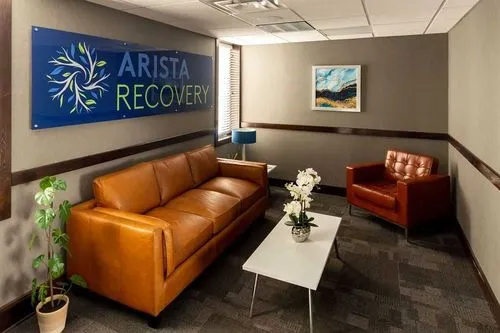Medication-Assisted Treatment Program In Kansas
Thoughtfully prescribed medications like Suboxone or Vivitrol combined with trauma-informed therapy to reduce cravings and support long-term change.
.webp)

An Introduction to Medication-Assisted Treatment
Medication-assisted treatment in Kansas City can be an excellent solution for you or someone you love if you struggle with substance abuse. Medication-assisted treatment, or MAT, is a form of rehab therapy that not only addresses the safety concerns of detox from highly addictive substances but the underlying factors that contribute to relapse.
From detox to aftercare addiction treatment in Kansas, Arista Recovery can help.If you are ready for help, reach out to Arista to learn more about our Kansas City MAT addiction treatment.
What Exactly is Medication-Assisted Therapy?
Medication-assisted treatment in Kansas City it’s a specific type of treatment that uses FDA-approved medications to help you cope with any withdrawal symptoms and reduce cravings you might have after your initial detox. When using these FDA-approved medications, you are also required to remain under supervision throughout your detox process because all drugs are prescription based and require medical monitoring.
After your initial detox, you should participate in ongoing therapy. What type of therapy you use might look different from one Kansas City MAT rehab center to another. However, you will generally remain at the facility for your initial detox and either stay at the facility for part of a residential program or return to the MAT drug and alcohol rehab center in Kansas City during the day for your regular therapy appointments.
How Medication-Assisted Therapy Helps People Recover
Certain addictive substances like alcohol and opioids come with a variety of health complications and are difficult to stop cold turkey. You are often likely to have higher success rates if you are able to wean yourself off of those substances using drugs that are less addictive.
With Kansas City MAT addiction treatment, prescription drugs are provided under two circumstances:
- The first is during your initial detox. If, for example, you are detoxing from opioids, you might be given a prescription for less addictive substances to help you manage the withdrawal symptoms.
- The second is during your ongoing therapy. You might be given medication to block the effect of alcohol when you drink or to decrease cravings from opioids. In these cases, you are able to remain sober longer because your brain and body don't register the positive effects of substance abuse.
To learn more about what addictions benefit from MAT, call Arista Recovery in Kansas.
What are the Benefits of Medication-Assisted Treatment?
A MAT drug and alcohol rehab center offers specialized treatment for specific addictions. There are two very important benefits:
Manage Withdrawal Symptoms
The first is the ability to manage your withdrawal. Certain substances are next to impossible to quit on your own because the withdrawal symptoms are so severe and dangerous. It becomes much more feasible if you have help from a Kansas City MAT rehab center.
Manage Ongoing Cravings
The second is your ability to manage ongoing cravings. Regular substance abuse changes the structure of your brain and the way your reward center works. The part of your brain that controls impulses gets smaller, and the part of your brain that rewards you for impulsive actions like drug use and alcoholism gets bigger.
Simple triggers like seeing a store where you used to buy alcohol or the hospital where you used to purchase prescription opioids can trigger neurological signals that result in uncontrollable cravings. The medications used in this type of treatment reduce those signals and change how intense they are, making you much more likely to avoid a relapse.
Reach out to Arista to visit our Kansas City MAT rehab center. Have questions about how medication-assisted treatment works? Call our caring admissions team 24 hours a day, 7 days a week.
What Medications are Used to Treat Addiction?
The medications you might use during treatment can help you wean yourself from the addiction so that you can slowly transition to something less harmful and then to no drugs at all, or they are meant to induce adverse effects from using or drinking so that you don’t have positive associations with drug and alcohol abuse anymore. Categories include:
Alcohol Antagonists
This means you get sick when you consume alcohol instead of feeling any positive effect which helps to reduce the risk of relapse.
Examples: Disulfiram is an antagonist that causes unpleasant feelings if you drink, like chest pain, headaches, vomiting, and nausea. It comes in the form of a tablet you take once a day to avoid relapse.
GABA Analogs
These block the brain signals associated with withdrawal symptoms from alcohol so you can recover more comfortably.
Examples: Acamprosate is administered within five days of your detox and helps to block the negative withdrawal symptoms. It comes in tablet form, and it helps to reduce alcohol cravings.
Opioid Agonists
Opioid agonists attach to the same brain receptors as an opioid, but don’t cause the same high. They are used to alleviate the side effects of cravings; instead of abusing opioids to get rid of intense cravings, you use this medication which alleviates the discomfort but doesn’t get you high.
Examples: Methadone is a popular opioid agonist which helps control cravings. It comes in the form of a tablet or an oral concentrate. Buprenorphine is a partial opioid agonist that reduces cravings and withdrawal symptoms. It comes in an injection, tablet, a film you apply to your skin, or a subdermal implant.
Opioid Antagonists
These help to block opioid receptor activation, so they won’t get rid of your withdrawal symptoms, but they’ll decrease cravings a lot, and they’ll prevent you from feeling high when you use opioids.
Examples: Naltrexone is an opioid antagonist that prevents you from feeling any high if you take opioids which helps reduce the long-term risk of cravings or relapse. It comes in the form of an injection.
Are There MAT Drug Rehabs?
You can get individualized help with your addiction at a Kansas City MAT rehab center. The only way to receive this treatment with the proper medication locally is at a designated MAT drug and alcohol rehab center in Kansas City.
Some facilities function exclusively as medication-assisted treatment centers, while others offer medication-assisted treatment in addition to regular detox. When evaluating different rehab centers, you not only want to look for Kansas City MAT addiction treatment but for any other services you might require, such as:
- Residential programs and ongoing services like partial hospitalization programs or outpatient programs
- Dual diagnosis services for co-occurring mental health and substance abuse disorders
- Holistic therapy like yoga or mindfulness
Call Arista to learn about our MAT and how we can help you.
Don't Wait Any Longer Get in touch
Make the Call That Will Change Your Life.
Speak to one of our caring intake coordinators 24 hours a day, 7 days a week.

What We Do
Treatment Programs at Arista
Yes. Arista Recovery is in-network with many commercial providers, including Aetna, Anthem, Cigna, Humana, and United Healthcare. We’ll verify your benefits quickly and confidentially so you can focus on healing, not paperwork.
Treatment length varies depending on your needs. Some begin with 30 days of inpatient care, while others benefit from extended residential or outpatient programs. Our team works with you to create a plan that fits your goals and insurance.
We combine clinical excellence with deep compassion. Our programs use evidence-based therapies alongside equine therapy, horticulture, trauma-focused care, and expressive arts. Recovery at Arista is not just about stopping use – it’s about resetting your life with dignity and purpose.
Yes. While long-term meth use may cause cognitive and emotional changes, the brain has the ability to heal. With consistent treatment, supportive therapy, and lifestyle changes, many people regain stability, rebuild relationships, and thrive in recovery.
During withdrawal, your brain and body begin adjusting to life without meth. This can involve fatigue, intense cravings, anxiety, depression, and disrupted sleep. Professional detox at Arista ensures you are monitored and supported during this phase so symptoms can be managed safely.
After inpatient rehab, you may transition to outpatient services, sober living, or a personalized aftercare plan. Arista Recovery helps each client prepare for life after treatment to ensure continued support and stability. Our Overland Park location offers many outpatient care options as well for a step-down in care.
Absolutely. Family involvement is encouraged and often a key part of the healing process. Many inpatient rehab programs offer family therapy sessions and education to support long-term recovery.
Pack comfortable clothing, basic toiletries, prescription medications in original bottles, and any important documents. Avoid bringing valuables or electronics unless approved by our facility.
Yes, many insurance plans cover all or part of inpatient rehab, but coverage depends on your provider and policy. Arista Recovery can help verify your benefits and walk you through the financial options available.
If your substance use is disrupting daily life, relationships, or health, or if you've tried outpatient care without success, inpatient rehab may be the best fit. A professional assessment can help you determine the right level of care.
Our Overland Park outpatient center equips you to apply coping strategies in real-world situations while managing responsibilities like work or school.
Clients receive ongoing therapy, peer support, and medication-assisted treatment (if appropriate), along with frequent check-ins to adapt strategies as new challenges arise. It’s a flexible yet structured way to maintain progress in recovery.
At our Paola facility, clients receive 24/7 medical supervision during detox to ensure cravings are managed safely and comfortably.
In residential care, clients participate in daily therapy, equine and horticulture therapy, and skill-building exercises designed to help identify triggers and build strong coping tools – all within a structured, supportive environment.
Proper nutrition prevents blood sugar crashes that trigger intense cravings, while regular exercise releases natural endorphins that improve mood and reduce stress without substances.
Also, when you're tired from poor sleep, your brain craves quick fixes for energy and mood, making cravings much more intense and harder to resist.
Our on-site chef at Arista Recovery's Paola facility creates meals specifically designed to support recovery and reduce cravings, while our Synergistic Recovery Program combines physical movement with therapeutic processing to build both physical and emotional strength.
Triggers are the specific people, places, situations, or emotions that remind your brain of past substance use – like stress from work, certain social events, or feeling bored with too much free time. Cravings are the intense urges that follow these triggers.
At Arista Recovery's Paola and Overland Park locations, we help you identify your personal trigger patterns through therapy and journaling so you can develop specific strategies for each situation before cravings hit.
Cravings are intense urges to return to substance use, often feeling overwhelming because the brain's reward system has been rewired by addiction and still vividly remembers those chemical rewards.
As you recover from substance use disorder, your brain naturally seeks to recreate those intense feelings, manifesting as temporary but manageable urges.
Understanding that cravings are a completely normal part of the recovery process, and not a sign of weakness, provides tremendous power in managing them. They represent valuable opportunities to practice your recovery skills, rather than evidence of failure.
Kansas has expanded treatment funding and distributed naloxone (Narcan) to help reverse opioid overdoses. Despite these efforts, many areas still face care access issues, which makes centers like Arista Recovery in the Kansas City region vital for providing quality, trauma-informed treatment.
Arista Recovery offers full-spectrum prescription drug treatment services at its Paola and Overland Park locations, just outside Kansas City. These facilities provide detox, residential care, outpatient programs, and evidence-based therapy like CBT and DBT.
Warning signs can include behavioral changes like doctor shopping and secrecy about medication use, physical symptoms such as drowsiness or mood swings, and psychological signs including increased anxiety or cravings.
Early detection is crucial for preventing prescription drug abuse from progressing to full addiction.
The three main categories are opioids (like oxycodone and hydrocodone), benzodiazepines (such as Xanax and Valium), and stimulants (including Adderall and Ritalin).
Opioids represent the most dangerous category with millions of Americans struggling with these medications annually.
Prescription drug abuse occurs when someone uses medication in ways not intended by their prescribing physician, such as taking higher doses, using without a prescription, or combining with other substances.
This misuse can quickly lead to dependence and serious health consequences, even when it begins with legitimate medical treatment.
The best way to determine if DBT fits your recovery needs is through a confidential assessment with our clinical team. Contact Arista Recovery today at 877-279-0095 to discuss your situation and explore how DBT can become part of your personalized treatment plan.
DBT treatment duration varies based on individual needs, but most programs involve weekly individual therapy sessions and skills training groups for several months. The skills learned become lifelong tools for maintaining sobriety and emotional well-being.
Arista Recovery provides DBT services to clients across Kansas, Missouri, Oklahoma, and Nebraska through our inpatient facility in Paola, Kansas and outpatient center in Overland Park, Kansas. We accept most major insurance plans to make treatment accessible.
DBT works especially well for individuals with co-occurring mental health disorders like PTSD, depression, anxiety, or borderline personality disorder alongside their substance use disorder. It's also highly effective for people who have experienced multiple relapses due to emotional or relationship stressors.
DBT focuses on teaching concrete skills for emotional regulation, distress tolerance, mindfulness, and interpersonal effectiveness rather than just talking through problems. This structured approach gives clients practical tools to manage triggers and cravings without turning to substances.
Yes. Arista Recovery’s Overland Park, Kansas location offers flexible outpatient options, including an intensive outpatient program (IOP) and a partial hospitalization program (PHP).
These programs allow you to attend treatment sessions while living at home, and they are ideal for individuals transitioning from inpatient care or balancing recovery with work or family commitments.
Arista Recovery offers comprehensive inpatient heroin addiction treatment at our state-of-the-art facility in Paola, Kansas, just south of Kansas City.
This location provides 24/7 medical detox, residential care, and a supportive environment designed to help you fully focus on recovery with access to therapy, holistic services, and medical care.
Medical detox at Arista Recovery's Paola facility provides 24/7 medical supervision during the most dangerous phase of heroin addiction recovery, typically lasting 5-7 days.
Our medical team uses MAT when appropriate, with FDA-approved medications like buprenorphine and methadone to safely ease withdrawal symptoms and reduce cravings.
You'll never be alone during withdrawal, and our comfort-focused care means we do everything possible to keep you safe and as comfortable as possible during this difficult but crucial first step.
Our comprehensive approach goes beyond just getting clean – we focus on healing the whole person through evidence-based care delivered with heart, treating both addiction and the underlying mental health conditions that affect about 80% of people with heroin addiction.
At our Paola, Kansas facility, we provide 24/7 medical detox, while our Overland Park location offers flexible outpatient programs that allow you to maintain work and family responsibilities.
We also combine proven medical treatments like medication-assisted treatment (MAT) with innovative holistic therapies including equine therapy, art therapy, and horticulture therapy for complete healing.
Heroin hijacks your brain's reward system by flooding it with dopamine and stopping natural feel-good chemical production, meaning you need heroin just to feel normal, not to get high.
The relapse rate within the first year can be as high as 96% without proper treatment, which is why medical supervision is absolutely essential, as trying to quit heroin alone is not only nearly impossible but potentially fatal.
Arista’s Overland Park outpatient program includes ongoing nutritional therapy support such as meal planning, grocery shopping guidance, and nutrition check-ins with licensed dietitians.
These services are designed to fit your work and home life while helping you maintain healthy habits and avoid relapse triggers.
At Arista Recovery’s Paola, Kansas facility, clients in detox and residential treatment receive therapeutic meals, nutrition education, and supplementation tailored to their individual needs.
The program emphasizes gentle nourishment during detox, structured meal routines in residential care, and integrated therapy support for emotional and physical healing.
Nutritional therapy recovery is particularly powerful for dual diagnosis treatment because proper nutrition directly supports brain chemistry balance needed for both addiction recovery and mental health stability.
Our team coordinates closely with your psychiatrist to address any nutritional side effects from psychiatric medications and ensure your meal plan enhances your medication's effectiveness rather than interfering with it.
Our nutritional therapy recovery program integrates seamlessly with all aspects of your treatment rather than being an afterthought, with our professionals attending team meetings and collaborating directly with your therapists and medical team.
At our Paola facility, our on-site chef prepares recovery-focused meals designed specifically by dietitians for people in recovery, while innovative programs like horticulture therapy connect nutrition education with growing your own food.
This comprehensive approach means your nutrition plan adjusts based on your progress in therapy, medication changes, and evolving recovery needs throughout your entire treatment journey.
Different substances affect your body's ability to absorb and use essential nutrients in distinct ways that require targeted nutritional intervention.
For example, alcohol depletes critical B vitamins that your brain needs for proper function, while opioids slow digestion and suppress appetite, leading to severe malnutrition and weakened immune function.
Additionally, stimulants like cocaine and methamphetamine cause dramatic weight loss and nutrient depletion, creating deficiencies that directly contribute to mood swings, cravings, and difficulty managing stress.
Arista Recovery’s Overland Park location offers an intensive outpatient program (IOP) to allow individuals to receive care while continuing to manage work, school, or family responsibilities.
Sessions include group therapy, individual counseling, and holistic practices.
Arista Recovery offers comprehensive treatment at two locations near Kansas City – medical detox and inpatient care at our Paola rehab, and outpatient programs at our Overland Park center. Services include therapy, medication management, family support, and holistic care.
Physical signs include constant drowsiness, slurred speech, poor coordination, and blurred vision, while behavioral changes involve visiting multiple doctors for prescriptions, being secretive about medication use, and running out of prescriptions early.
These signs often indicate it's time to seek professional help, as benzo addiction rarely improves without specialized treatment.
Unlike many other drugs, stopping benzos suddenly can be life-threatening and cause seizures, severe anxiety, and even psychosis. The withdrawal process requires gradual tapering under medical supervision over weeks or months to minimize dangerous symptoms.
At Arista Recovery's Paola facility, our medical team provides 24/7 supervision during benzo detox because attempting to quit "cold turkey" at home is extremely risky and potentially fatal.
Benzo dependence can develop surprisingly fast, often within just a few weeks of regular use. Your brain adapts to needing the medication to feel normal, and tolerance builds quickly, meaning you need higher doses to achieve the same calming effect.
What starts as legitimate medical treatment for anxiety or panic disorders can escalate to misuse patterns before you even realize dependence has formed.
Yes. Arista Recovery integrates holistic services such as art therapy, yoga, mindfulness training, horticulture therapy, and equine therapy into our outpatient programs. These support emotional regulation, self-awareness, and stress management alongside traditional evidence-based treatment.
With convenient locations in Paola and Overland Park, Arista Recovery serves rural and suburban communities throughout Kansas and neighboring states. We offer flexible scheduling and telehealth options when appropriate to ensure access for those traveling longer distances.
Outpatient rehab works best for individuals who are medically stable, have a strong support system at home, and are motivated to engage in recovery. It's also ideal for those stepping down from inpatient care or managing responsibilities like work and family.
Arista Recovery offers multiple levels of outpatient care at our Overland Park facility near Kansas City, including outpatient programs, an intensive outpatient program (IOP), and our partial hospitalization program (PHP).
Each is tailored to meet different needs, from mild support to daily intensive care.
Outpatient rehab provides structured addiction and mental health care while allowing clients to live at home.
Unlike inpatient treatment, which involves 24/7 residential care, outpatient programs offer flexible scheduling – ideal for those who want to continue working, attending school, or supporting family while receiving therapy and support.
Arista Recovery accepts most major commercial insurance plans. Both the Paola inpatient facility and Overland Park outpatient center offer holistic treatment options covered under many insurance policies. Call our admissions team 24/7 for a confidential benefits check and consultation.
Clients can access a wide range of holistic therapies, including equine therapy, horticulture therapy, art and music therapy, mindfulness practices, yoga, nutritional counseling, and recreational activities. Each therapy is tailored to support individual needs and recovery goals.
Yes. Arista Recovery provides holistic addiction treatment at two accessible locations near Kansas City – Paola and Overland Park. Both centers offer integrated programs that combine medical care with holistic therapies in a supportive, healing environment.
Holistic rehab teaches sustainable life skills that support sobriety, including stress management, emotional regulation, healthy eating, and physical wellness. Practices like mindfulness and movement therapy help clients respond to triggers more effectively, reducing the likelihood of relapse over time.
Holistic rehab treats addiction by addressing the mind, body, and spirit – not just substance use. It combines evidence-based therapies like CBT and DBT with holistic practices such as yoga, art therapy, mindfulness, and nutritional counseling.
This approach supports long-term recovery by healing the root causes of addiction, not just the symptoms.
We offer aftercare planning, relapse prevention strategies, family education, and alumni programs to help individuals maintain sobriety and build a healthy, substance-free lifestyle after treatment.
Our Overland Park center provides partial hospitalization (PHP) and intensive outpatient programs (IOP), including individual therapy, group counseling, and dual diagnosis support for alcohol addiction.
Yes, Arista Recovery offers both inpatient and outpatient alcohol addiction treatment in the Kansas City area through our Paola and Overland Park locations.
Alcohol withdrawal can cause dangerous symptoms like seizures, hallucinations, or delirium tremens (DTs). Medical detox provides 24/7 supervision to manage symptoms safely and prevent complications.
Early signs include drinking alone or in secret, developing a tolerance, experiencing withdrawal symptoms, and continuing to drink despite negative consequences at work, home, or in relationships.
Early intervention saves lives, and if you suspect someone you love is using fentanyl, you need to act immediately. Contact Arista Recovery today for 24/7 support and confidential assessment to determine the best level of care.
We work with most major insurance plans and can often start treatment within 24-48 hours.
Kansas has been devastated by fentanyl, with synthetic opioid deaths increasing by 790% between 2012 and 2021. In 2022 alone, Kansas recorded 754 overdose deaths – that's 26 deaths per 100,000 residents, the highest rate the state has ever seen, with fentanyl involved in 56% of these deaths.
Rural Kansas faces unique challenges including limited access to treatment, longer emergency response times, and less awareness about fentanyl dangers.
Arista Recovery offers a full continuum of care for fentanyl addiction at two locations: inpatient detox and residential treatment in Paola, and outpatient programs in Overland Park. These programs include medical supervision, therapy, and medication-assisted treatment (MAT).
Fentanyl addiction can develop in a matter of days, not the weeks or months typically seen with other opioids. This synthetic drug is 50-100 times stronger than morphine, flooding your brain's opioid receptors with such intensity that your brain chemistry changes almost immediately.
Unlike prescription painkillers that gradually create dependence, fentanyl's extreme potency means tolerance builds rapidly, leading people to take more and increasing their overdose risk.
At Arista Recovery's Paola location, we see firsthand how this addiction cycle devastates Kansas families, which is why our medical detox program provides 24/7 supervision during the critical early stages of recovery.
The primary danger of fentanyl lies in its unpredictable potency and the fact that it's being mixed into everything, such as cocaine, heroin, or even fake prescription pills that look exactly like real Percocet or Xanax.
An amount smaller than a few grains of salt can kill someone, and overdose can happen within minutes through respiratory failure.
Yes. Arista Recovery connects clients in Kansas, Missouri, Oklahoma, and Nebraska to aftercare services, alumni programs, and peer support groups to ensure lasting recovery beyond treatment.
We believe healing happens together. Our family program offers education, therapy, and communication tools so loved ones can better support recovery and heal alongside the individual.
Arista Recovery offers dual diagnosis treatment in the Kansas City area through two convenient locations: inpatient services at our Paola, KS campus and outpatient care at our Overland Park location.
Both sites provide personalized treatment plans that include therapy, medication management, and holistic support.
Treating only one condition often leads to relapse or worsening symptoms. Mental health and addiction issues frequently reinforce each other, so integrated care that addresses both leads to better outcomes and long-term stability.
Dual diagnosis recovery is a treatment approach for individuals facing both a mental health disorder and a substance use disorder at the same time. It’s ideal for people who turn to substances to cope with emotional pain or who continue to struggle with symptoms even during periods of sobriety.
Family education is crucial because it helps loved ones understand addiction as a medical condition rather than a moral failing, while also teaching them how to provide effective support specific to your addiction type and avoid enabling behaviors.
Different addiction types create different family dynamics and challenges – for instance, families dealing with opioid addiction face overdose risks and may need naloxone training, while those supporting someone with gambling addiction need to understand financial boundaries and warning signs.
At Arista Recovery, our family integration program ensures your entire support system understands your specific addiction type and learns practical skills for supporting your recovery journey while maintaining their own emotional health.
Our dual diagnosis program treats addiction and mental health conditions simultaneously rather than separately to ensure all symptoms are properly and comprehensively supported.
Our evidence-based approach combines psychiatric care, specialized trauma therapy, and addiction treatment in one comprehensive program that addresses the whole person, not just the symptoms.
Yes. Arista Recovery offers intensive outpatient (IOP) and partial hospitalization (PHP) programs at our Overland Park location, serving the broader Kansas City community. These programs offer flexible schedules for people balancing treatment with work or family responsibilities.
Arista Recovery provides 24/7 medically supervised detox at our Paola, Kansas facility, located just outside of Kansas City. This ensures safe withdrawal from substances like alcohol, opioids, and benzodiazepines with professional monitoring and support.
Different addiction types require completely different treatment approaches because substances affect your brain and body in unique ways, meaning what works for alcohol addiction may be ineffective or even dangerous for opioid dependence.
At Arista Recovery's Paola and Overland Park locations, our treatment teams specialize in identifying your specific addiction type and creating personalized treatment plans that address the unique challenges and medical needs of your particular substance use disorder.
A physician, nurse, clinical staff, and therapist supervise the process of detoxing, which entails a comprehensive evaluation and the onset of detoxing substances from the body with the possible use of medication. Once the body is rid of toxic substances, the patient can begin addiction treatment.
Medical detox is the process of allowing your body to rid itself of drugs and other toxic substances—with the use of medications to reduce the symptoms of withdrawal and to make detoxing safer—that have been in the body for a length of time.
Our Unique Therapies
Explore our innovative approach to addiction treatment at Arista Recovery. From evidence-based therapies to holistic and experiential methods, we offer an immersive experience that works to treat the root causes of substance abuse our full continuum treatment programs












Educational Therapy
Explore Educational Therapy at Arista Recovery and how it can help you recover.
Cognitive Behavioral Therapy (CBT)
Explore cognitive behavioral therapy at Arista Recovery and how it can help you recover.
Dialectical Behavioral Therapy (DBT)
Explore dialectical behavioral therapy for addiction treatment and how it can help you recover.
Horticultural Therapy
Explore horticultural therapy at Arista Recovery and how it can help you recover.
Sand Tray Therapy
Explore sand tray therapy at Arista Recovery and how it can help you recover.
Experiential Therapy
Explore experiential therapy at Arista Recovery and how it can help you recover.
Synergistic Therapy Recovery Program
Our Synergistic Recovery Program programs in Kansas City provides effective training, both in the physical and mental domains.
A simple & easy same-day admissions process.
Contact
Reach out to our caring admissions team via phone, text or webform.
Verification
We will do a free verification of benefits to ensure your coverage options.
Pre-screening
We will do a quick confidential pre-screen to ensure we are a fit for you.
Treatment
We will schedule transportation and your intake at Arista Recovery.
Testimonials
Hear From Others in Our Recovery Community
Arista Recovery is a comprehensive drug and alcohol detox center in Missouri. We specialize in multiple levels of care, which means if you are addicted to alcohol, we can help you with a medication-assisted treatment plan that targets the most severe symptoms over the first week of your detox and then gives you ongoing medication and therapy to help you stay sober.
We can also work with you for addiction to things like cocaine, providing medication during your first few days, problems with rebound insomnia, and medication and therapy to help you cope with the months of cravings that often follow.
Arista Recovery provides an inpatient drug rehab in the Midwest. Once you finish your supervised detox, you can start a residential program at our state-of-the-art, 38-acre facility or a partial hospitalization program if you need something more intense and shorter. We can also help you gradually transition into an intensive outpatient or standard outpatient level of care.















